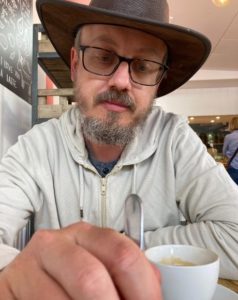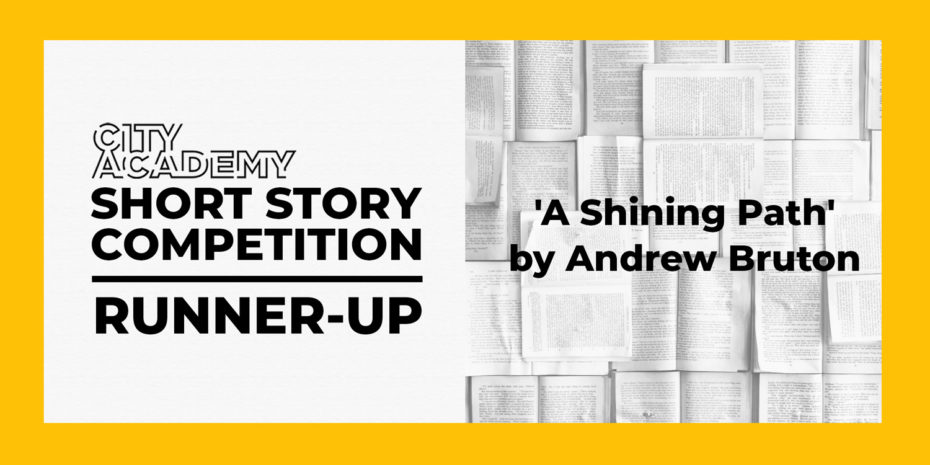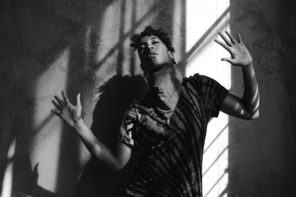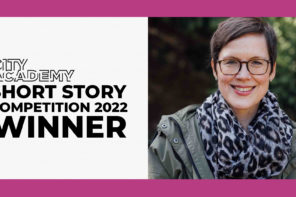'A Shining Path' by Andrew Bruton for our City Academy Short Story Competition 2021.
A Shining Path
Santa Clara was as close to God as the Andes would take you; a frozen, wind-blown place that clung to the mountain, and where only father Alonso and the birds looked the creator straight in the eye. The town perched on a plateau overlooking the steep, barren slopes of dirt and eucalyptus. The fertile land was a two hour walk away, two thousand metres below. At five each morning the glow of kitchen fires sparked through the dark patchwork of houses, corrugated iron rooves, their chimneys propped open with adobe bricks, spilled out gusts of cooked corn, broad beans and sopa de leche that drifted up main street to my open bedroom window.
Dad always made noise in the kitchen. It woke me long before I needed to get up, but I loved to lie there listening as he talked to himself, and sometimes to Mamá.
‘What goes in first? The milk or the eggs?’
It was commonly believed that Mamá must have been answering him, for as a widower, his cooking was unrivalled, and the women who passed by the house swore Mamá was still tinkering with her recipes from the great beyond. But as most families began the long walk down into the lush valleys below, with the dawn already chasing them, dad and I walked uphill, just the two of us, against the flow.
Dad ran the mill. His father-in-law, my Papi José, had insisted he take over when Mamá passed. Papi José was a hard man with a tongue as fast and hard as the whip he used to beat his horse. His features were cold like mountain frost, a taut parchment blown stiff and rough by a life outdoors, his sombrero pulled low on his brow. If he had shed a tear on losing his only daughter none had seen it, or those who did had been too scared to speak of it. Half the town worked for him, directly or otherwise, they would nod skyward as his horse clipped by, smiling tightly and hurrying past with some sudden, urgent business that required them to be somewhere else.
The mill was one of only a handful of buildings in town with glass windows and plastered walls. It looked like the lighthouses I had seen in Papi José’s encyclopaedia, tall and isolated, white walls, thick stone slabs on the floor and thick wooden beams to support the mill stones. Even with the troubles in the region, people needed flour.
Mornings were my favourite time, just the two of us, setting traps for the rats, shaking out the empty sacks and running corn through the mill to clean the stones. Dad would light a fire if we had wood, and when it ran out, one of Papi José’s men would appear like magic with a donkey and a fresh stack. Most mornings, around six o’clock, the sun would finally slip through the shutters and cut bright white lines on the stone floor, like fingers seeking out the shadows. I invented reasons to avoid stepping on them. It helped to pass the time. The high plains were dry. Nothing escaped the dust. It didn’t matter how often I swept, the earth and flour continued to dance and swirl in that piercing light. I would grumble as I wrestled the broom over the floor and then Dad would say ‘Pity the man who finishes all his chores.’ Honestly, I desperately wanted to be that man, if only for a day.
The women would start arriving around seven, strong, thick, short legs working at pace in the thin mountain air. Some brought grain to mill, some were collecting flour, but all brought news. They would sit, legs spread apart, pulling thick woollen socks up past their knees under layers of heavy skirts. Humble folk, they spoke in Quechua, often of things not intended for my young ears. Everyone had an opinion. I remember feeling that Papi José looked down on them, even when not on horseback, and yet he seemed to be regarded with affection whenever his name came up. If he needed something he rarely spoke to his workers with any patience, and few of them would have been able to tell you the colour of his eyes, such was the intensity of his presence. For instance, at family dinners it was forbidden to laugh at the table. Papi José would tell stories about his day, mimicking the labourers’ accents perfectly, delivered with such a dry wit and colourful nicknames that condensed someone’s essence into a simple, visual and comical shorthand. My cousins and I faced the belt on more than one occasion for failing to pass this test.
Dad was different. I think that’s why mum married him. He was quiet like Papi José, but kindness shone from him and he made sure you knew how important you were as he busied himself with the grains, keeping the donkeys turning the mill stones at precisely the right speed. He had nods for any situation and caused people to feel so comfortable they would say more than they should in his company.
The army had a strong presence in town. Attacks were rare, but government troops were pushing back hard, and it was common knowledge that the terrorists were mostly farming folk. Nobody really knew who was involved and who wasn’t, but it didn’t stop people guessing. We had family on both sides of course, army and terrorist. I expect that’s why the troubles never seemed to fully catch up with us. The famous death list had supposedly been seen by some. Papi José was usually on it. Dad heard names every day. Neighbours would spill their guts as he spilled grain down the chute. He was therapist to many, a sounding board and a safe pair of ears that nobody feared, and everyone trusted. José’s son-in-law. When army raids on houses happened during curfew, we knew about it hours before. The captain, his ironed, colourful medals out of place in this dull province, made regular visits.
‘Delgado Street will be busy tonight.’ he would say, and with that we knew who not to visit or who to inform and made sure we were home long before the generator spluttered and fell silent at seven o’clock. The Captain left with flour of course. Often, the very same day, local women who were prone to breaking curfew would speak of Lima’s oppression and of family lost to government raids and death squads. Dad would say something like ‘Your sister lives on Delgado right?’ and nothing more needed to be said. And this is how we existed, balancing the equation, feeding the protagonists of our country’s latest folly.
The day it happened may have been a Friday, but this fact changes nothing, and it would have been just as awful had it been any other day. Night drew around the mill as the fire’s embers cooled and we prepared to close for the day. It was the eve of the 28th, our Independence Day. Rats cared nothing for national holidays, so we set extra traps.
Even before our single, naked bulb flickered and died I felt the hairs on my skin stand up. Sudden darkness, then a red glow from the window facing town lit my father’s face and a sound like a sack of rocks being dropped on the roof of the woodshed thundered over us. The glass from the window exploded into the mill and my father covered me with his body.
‘Hijo! Get behind the stones’ he shouted, running to the broken window and peering out.
‘Dad, what’s going on?’ I was desperate to run over and bury my face into his thick jumper and put my arms around him. He was scanning the streets, muttering to himself.
‘They’re a day early.’ he said.
I pieced it together almost instantly from that, fragments of conversations over the past few days, all filed away ready for the detail to be painted in. ‘They’ve hit the generator hijo. There’s no power in town.’ He called me over with a wave of his hand, signalling the exact route I should take to reach him with one silent, flowing gesture. ‘We have to get home right now!’ he said. ‘I want you to stick by me and do everything I say. Do you understand?’ I nodded invisibly in the thickening darkness. Outside, the night was cold. Dad snapped the heavy padlock into place. I knew I was too big to carry, but I still longed for that feeling of safety. He grabbed my hand and we set off down a side street that would lead us past the open-air abattoir by the cliffs. I hated this street. The smell would ambush you long before you got there, but on busy days it was the sound that carried further. The pigs were the worst, but nothing bled out quite like the cows. Mamá had slipped there once when I was a baby, stepping on some part of the animal and falling backwards on the concrete slab. I was asleep, tightly wrapped in a thick alpaca blanket on her back. She should have crushed me, but somehow, she flipped herself sideways and cracked four ribs, saving me. As people rushed to help her, I started to cry as the slick of hot blood flowing across the polished concrete soaked into the blanket and began to drown me. It would only have been seconds, but when my screaming mother unwrapped me I was so covered in blood it looked as though my entire body had been pulverised. I was stripped naked, and a bucket of water was thrown over me to clear the blood and check for injuries. No physical harm done to me, but Mamá spent months recovering.
Dad turned right a street before the cliffs. People cracked open windows to see what was happening, but dad shouted for them to stay indoors and get out of sight. Nobody hesitated. The sky ahead of us was orange and the heat roared loudly, snaking through the streets, chasing the cold air out of town. We crept around the church, hands running along the adobe walls, hugging the shadows that thinned and gorged with the dancing flames. The generator was ablaze, its fences ripped apart and at least three houses lay in ruins on either side. Thick columns of spiralling black fumes raced into the sky, lit only so far by the fire before being sucked into the starless void.
The last fifty metres we ran, my dad dragging me at the limit of my shaking limbs. Once in the kitchen we dragged the table and propped it against the door, shuttered the windows and looked at one another.
‘Let’s go upstairs’ dad said.
I took the stairs two at a time and crawled under my bed, reaching up to drag my blanket down, but dad was beckoning me to the window ‘Come here son.’ I crawled over, keeping low and lifted my head just enough for my eyes to clear the sill. ‘Look there!’ he said.
I followed his finger down to the main square. More buildings were on fire, all leading from the edge of town to the police station where the army was based. A shining path that pointed like an arrow at its target. ‘They’ll not come back this way’ he said, as he rested his warm, steady hands on my shoulders and bent down to kiss the top of my head. ‘They’re looking for the Captain.’ I’m ashamed to say I felt warmth at this news even as the buzzing guilt filled my ears, and my cheeks flushed with shame.
***
Dad woke me early and told me to stay inside while he checked on some things. After he left, I waited five minutes and snuck out. The streets smelled of burnt fuel and the generator still puffed darkness into the haze of the clear winter sky. It would be weeks before we had power again. There hadn’t been any gunfire or explosions for hours, and I felt safe weaving through the streets. Curfew had passed, but nobody ventured out, so the dogs were busy in the bins. I approached the corner of the square and poked my head around.
There were more bodies than I could count. No time to dwell on the novelty of death that I saw. Not death like my mother’s, neat, ceremonial, sterile. This was raw, violent death. My eyes landed on every body, every body part. I began to smell something familiar, the scent of the abattoir on market day. My guts twisted and I threw up on myself until nothing was left but acid, and I began to sob, face down in the dirt.
‘Mijo!’ came a voice from above me. I looked up and saw the outstretched hand of Papi José, standing next to me, the reins of his horse held tightly in the other. I leapt up and grabbed his hand, hugging him tight, forgetting protocol. I heard the reins drop and felt his two arms around me, cupping the back of my head as I soaked his shirt with my tears.

About Andrew Burton
Andrew Bruton is a 44 year old father of two, teaching MFL in Wiltshire who lives in Frome, Somerset. He spent nine years in Peru working on his wife’s organic coffee farm near Machu Picchu where they also ran an award-winning B&B. He is currently working on his first novel.






